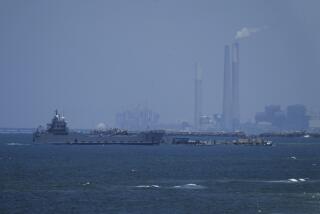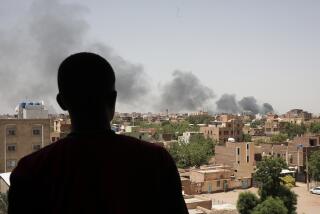Iraqi Police Near Refugee Camp Wage Psychological Warfare on Town : Kurds: Shooting is heard at night in half-deserted Zakhu. A U.S. relief copter crashes.
- Share via
ZAKHU, Iraq — For the third day, a brazen band of Iraqi policemen Tuesday waged psychological warfare against the frightened residents of this half-deserted border town, complicating the United States’ efforts to secure an enclave in northern Iraq where it says it will settle huge numbers of refugees.
With at least half of the agricultural town’s 50,000 residents among the nearly half-million mostly Kurdish refugees from Iraq scattered in a dozen mountain camps along the Turkish-Iraqi border, the police officers are deliberately intimidating the remainder, U.S. officials said. American Marines who sleep in combat-ready positions around the town report shooting there at night.
As construction of a tent city for refugees outside Zakhu continued at a plodding pace Tuesday, the United States flew more aid to the refugees and more Special Forces troops to distribute it and to help organize the camps.
A U.S. Navy Sea Stallion helicopter crashed Tuesday near a sprinkling of tents alongside a line of vehicles abandoned by the refugees in the mountains beyond Zakhu. The crew escaped uninjured, and a platoon of Marines was airlifted to the site to protect the aircraft until it can be recovered.
There was no evidence that the helicopter was attacked, although American pilots say a number of copters have been fired on over Iraq, without injury or serious damage, since the Marines moved into the U.S.-claimed 35-by-18-mile enclave over the weekend.
In response to the threat, U.S. Army Chinook helicopters ferrying supplies into the zone began carrying machine guns Tuesday, with orders to return fire if fired upon.
Dutch and French marines reinforced the American and British marines already in the zone Tuesday. The United States, in a pointed message to Baghdad, announced that a Navy battle group led by the carrier Theodore Roosevelt and the guided-missile cruiser Richmond K. Turner had arrived from the Red Sea to bolster six fleet vessels patrolling off the Turkish coast near northern Iraq.
The United States has demanded that Iraqi security forces leave the designated safe-haven area, but even as two Iraqi army battalions left Zakhu on Sunday, the estimated 300 police officers, some with automatic weapons, arrived on buses from Baghdad.
Now, attired in green-and-tan uniforms and red-and-black berets, they appear to be going out of their way to be conspicuous. On Tuesday, they glowered at passing Marines and made life uncomfortable for townsfolk.
The road from the nearby Turkish border to the budding refugee camp outside Zakhu passes through the town, which may be why supplies for the camps are still being delivered by helicopter and why there seems to be so little progress there.
The Iraqi police officers ripped out electric cables leading to a Marine-controlled village outside Zakhu, and they saw to it Tuesday that none of the locals were too friendly toward itinerant Americans.
“When we first arrived, people came to ask for work. Now they come and whisper: ‘We’d like to help, but these guys are taking names,’ ” said Fred Cuny, a disaster relief specialist working as a U.S. consultant in the enclave.
Two weeks ago, there were summary executions of Kurdish rebels in Zakhu, and on Tuesday fear was once again a fact of life on the streets of the ramshackle town.
“Police beat me before the Americans came. Now they are demanding that we give them lists of who is living in each house,” said 19-year-old Fuad Ali Mohammed.
Fearing reprisals by Iraqi troops loyal to President Saddam Hussein, Zakhu residents fled, along with more than 2 million other Iraqi Kurds, after the collapse of the Kurdish rebellion at the end of March.
In addition to the large numbers that the United States promises to shelter and protect in refugee camps without fences, American officials hope that the refugees who lived in what is now the protected enclave, such as those from Zakhu, will return to their homes.
If the police remain in Zakhu, however, that is unlikely, American officials concede. Iraq protests the safe haven as a violation of its sovereignty but has indicated that it will not interfere.
At a daily coordination meeting between Iraqi and American officers, the United States has been insisting since Monday that the police leave. They will insist again today.
“The Iraqis say they want to cooperate. This is not cooperation,” said Marine Col. Dick Naab, who represents the United States at the daily meetings. “It is threatening. We are making certain demands.”
At Turkey’s Incirlik Air Base, headquarters for the massive American relief effort, a spokesman was more sanguine.
“We are fully aware that there are 300 Iraqi policemen in Zakhu. They’re not interfering with the building of the sites,” said Lt. Cmdr. John Hopkins, a spokesman at the base.
Meanwhile, Iraq asked the United Nations on Tuesday to take over the camps set up by the United States and allied troops in the Kurdish north, Reuters news agency reported from New York.
In an apparent effort to pit the allied forces against the United Nations, Foreign Minister Ahmed Hussein Khudayer asked Secretary General Javier Perez de Cuellar “to assume responsibility for the centers” immediately.
The United Nations last week came to an agreement with Baghdad to set up refugee camps and transit stations all over Iraq, an operation that, for now at least, would have no connection to the allied effort in the north.
American officials here say they will settle Kurdish clan leaders at the tent city outside town within the next few days in hopes of luring their chary followers down from the mountains to join them.
However, construction of the camps, which are intended eventually to accommodate hundreds of thousands of refugees, is continuing at a snail’s pace.
On Sunday, sweaty U.S. Marines showed visitors 31 erected tents. Tuesday, with the same small work team at the site, there were about 250 tents, enough for fewer than 2,000 people.
There was one overworked forklift at the site but no sign of any construction equipment or building materials beyond some sheets of plywood. U.S. and British helicopters, meanwhile, brought in the camp’s first substantial supply of food.
At Incirlik, Hopkins would not directly respond to inquiries about whether there were hitches in the construction program.
“We’re working diligently to get to the point where we’re up and running,” he said.
More to Read
Sign up for Essential California
The most important California stories and recommendations in your inbox every morning.
You may occasionally receive promotional content from the Los Angeles Times.













